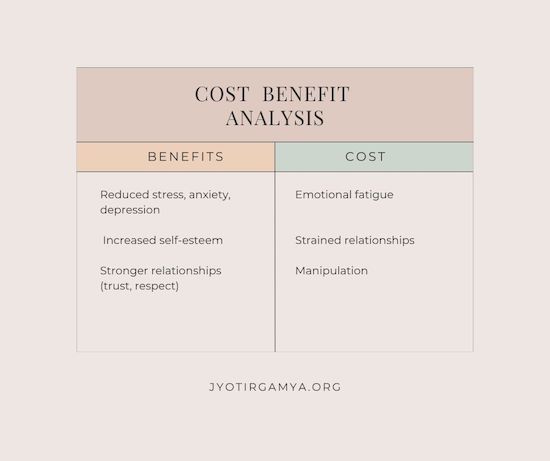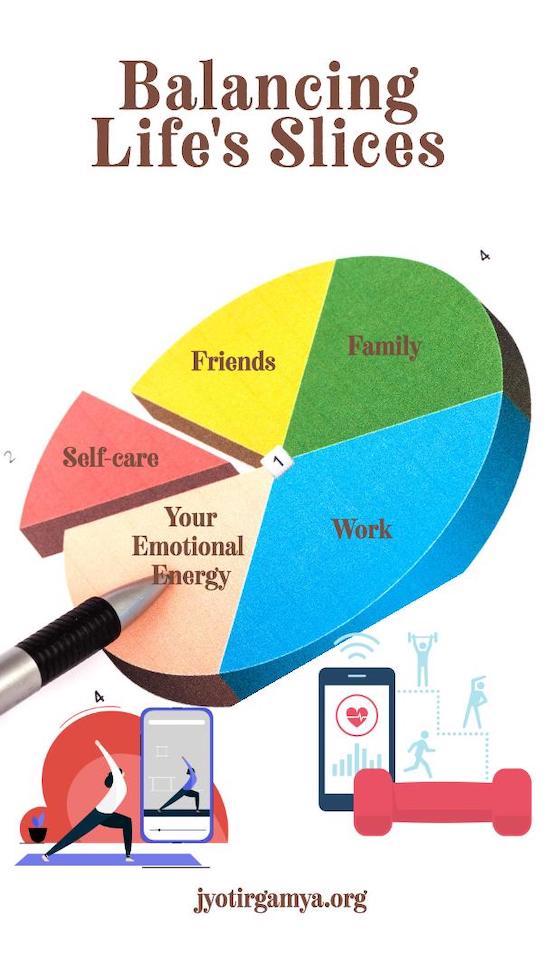Cost-Benefit Analysis of Healthy Emotional Boundaries
Do you ever feel constantly drained by the demands of friends, family, or colleagues? You may listen patiently to everyone’s problems but leave feeling emotionally exhausted. This could be a sign of unclear emotional boundaries.
Emotional boundaries are invisible lines we draw around ourselves. They help us understand where we end and others begin, emotionally speaking. Just like a healthy fence protects your garden, boundaries protect your emotional well-being.

Think about it this way: setting boundaries is like making a budget for your emotional energy. By understanding the costs and benefits, you can make informed choices about how much emotional investment you give and receive in your interactions.
Understanding Emotional Boundaries
Emotional boundaries are invisible lines we draw around ourselves. They show where our feelings and needs stop and where others begin. Think of them as personal space for your emotions.
Firm boundaries are important because they help us feel safe, respected, and in control. They also help us build healthy relationships. When we set boundaries, we teach others how to treat us.
Examples of Healthy Boundaries
At Work: Maybe you leave work at work. You don’t answer work emails at night or on weekends. This boundary helps you avoid burnout and gives you time to recharge.
With Friends: Perhaps you need some “me-time” to recharge after a long day. Saying “no” to going out every night isn’t mean, it’s a healthy boundary!
In Family: Maybe you don’t feel comfortable sharing personal details with a family member. It’s okay to set a boundary and say, “I don’t feel like talking about that.”
Boundaries can look different depending on where you’re from. In some cultures, putting yourself first might seem rude. In others, it’s expected! Understanding these differences can help you navigate relationships with people from different backgrounds.
The Cost-Benefit Analysis of Emotional Boundaries
Think of setting boundaries, like making a budget for your emotional energy. Let’s weigh the pros and cons to see why they’re essential.
Benefits of Healthy Emotional Boundaries
Setting boundaries can be a game-changer for your well-being. Studies show they can:
Lower stress, anxiety, and depression: When others' needs do not constantly drain you, you have more emotional energy for yourself.
Boost self-esteem: Knowing and sticking to your limits builds confidence and self-worth.
Boundaries also strengthen your relationships. Imagine them like a bridge – clear boundaries create a strong foundation for trust, respect, and open communication.
Costs of Not Setting Boundaries
Skipping boundaries can have hidden costs. Research suggests it can lead to:
Emotional fatigue: Feeling constantly pulled in all directions leaves you drained and overwhelmed.
Strained relationships: When you don’t say “no,” resentment builds, and connections suffer.
Manipulation: People can take advantage of your good nature if you don’t have clear boundaries.
Here’s a handy chart to keep it simple:

Boundaries in the Digital Age
Our phones and social media can be excellent tools, but they can blur the lines between work and personal life. This makes setting boundaries even more critical!
The Role of Technology and Social Media
Texts, emails, and social media can make us feel like we’re always “on.” This constant connection can be draining. Setting boundaries with technology means controlling how and when you use it.
- Taming Notifications: Turn off unnecessary alerts! Your phone doesn’t have to ping every time someone likes your post.
- Limiting Communication: Maybe there’s a group chat that stresses you out. It’s okay to mute it or leave!
Digital Detox Strategies
Taking a break from screens can be refreshing. A digital detox could be anything from turning off your phone for an evening to a weekend away. This space allows you to recharge and reconnect with yourself.
Addressing Cyberbullying
Cyberbullying can be hurtful, but healthy boundaries can help. Don’t be afraid to block bullies or people who make you feel bad online. Remember, you control what you see and who you interact with in the digital world!
Setting and Maintaining Healthy Boundaries
Learning to set and keep healthy boundaries is a skill, but it’s worth it! Firm boundaries can be a game-changer for your mental well-being and relationships.
How to Set and Maintain Healthy Boundaries
-
Know Your Limits: The first step is understanding your emotional limits. What drains your energy? Is it constantly being interrupted at work or feeling obligated to attend every social event? Maybe it’s simply needing some quiet time to recharge after a long day. Respond to your feelings in different situations and identify what feels emotionally overwhelming.
-
“I” Statements and Assertive Communication: Once you know your limits, it’s time to communicate them clearly to others. “I” statements are a powerful tool for assertive communication.
Instead of accusatory statements like : “You always interrupt me!”
Try the following : “I feel disrespected when I’m cut off mid-sentence. Can we let each other finish speaking?”
“I” statements focus on how a situation makes you feel and your desired outcome, making it easier for others to understand and respect your boundaries.
-
Practice Makes Perfect: Setting boundaries can initially feel uncomfortable, especially if you’re not used to it. But remember, it’s okay to say “no.” Be firm but kind in your communication. Don’t feel pressured to do things that make you uncomfortable or violate your emotional well-being. The more you practice setting boundaries, the easier and more natural it will become.
“Boundaries are about healthy self-care,” says a leading psychologist. “They show others how to treat you respectfully and create a foundation for healthy, balanced relationships.”
Real-life Example of Setting Emotional Boundary
Scenario: A friend of yours constantly vents about her problem and the fact that there’s so much that she is going through. Nobody understands her pain. You are the only one who can solve her problem, on and forth. But you feel emotionally drained by their negativity.
Practice: Put yourself in this situation and try using an “I” statement. “Hey, I care about you and want to be supportive, but listening to negativity all the time brings me down. Would you be open to discussing something else, or maybe I can offer some solutions instead?”
Self-Assessment: Reflect on situations where you struggled with boundaries. How can you improve next time? Maybe you need to be more upfront about needing time for yourself, or perhaps practice saying “no” in a kind but firm way.
Remember, setting boundaries takes time and practice. Be patient with yourself, celebrate your progress, and don’t be afraid to adjust your approach as needed. The more you prioritize your emotional well-being by setting healthy boundaries, the more you’ll find yourself thriving in all areas of your life.
Negotiating Boundaries and Addressing Challenges
It’s essential to set boundaries, be open to feedback, and navigate situations where boundaries might clash.
Feedback and Boundary Negotiation
Sometimes, our boundaries might not be perfect. It’s okay! Be open to feedback from loved ones, but remember, you get to decide what feels right for you.
Negotiation is vital in relationships. Maybe your friend wants to chat every night, but you only have energy once a week. Talk it out! A compromise could be a quick text check-in or a more prolonged weekend chat.
Preventive Measures
Respecting boundaries is a two-way street, too! Here are some ways to avoid stepping on other people’s toes:
-
Listen Up: Pay attention to what people say and don’t say. If someone seems stressed, maybe give them some space.
-
Respect “No”: “No” means no! Don’t pressure people into things they’re uncomfortable with.
-
Privacy Matters: Everyone deserves privacy. Don’t pry into someone’s personal life unless they want to share.
Emotional Boundary Examples
-
Work: Maybe your coworker likes loud music while you work best in the quiet. Talk to your boss about headphone zones or quiet work hours.
-
Family: A family member might constantly ask for loans. Be clear about your financial limits and offer alternative solutions, such as budgeting advice.
-
Romance: Your partner might share too much on social media. Talk about your comfort level with oversharing and find a compromise, like only posting positive updates.
Remember, boundaries are an ongoing journey. Be patient, keep learning, and celebrate your progress!
Parting Thoughts
Boundaries might seem tricky initially, but they’re like magic tools for emotional well-being. Firm boundaries help you feel less stressed, be more confident, and build healthier relationships.
Ready to give boundaries a try?
Practice Makes Perfect: Start small! Maybe try saying “no” to one extra social event this week.

Imagine a pie chart. One big slice is labeled “Your Emotional Energy.” The rest of the pie is divided into smaller slices for things like work, friends, family, and self-care. Firm boundaries help balance your pie chart, ensuring you have enough energy for everything that matters!
Remember, boundaries are a journey, not a destination. Be patient, celebrate your progress, and enjoy the benefits of taking control of your emotional well-being!
Further Reading
Perfectionism Paralysis: Unleashing Innovation with Servant Leadership
Unlocking the Power of DBT: A Focused and Unique Perspective
Embrace Imperfection for Mental Well-being: Finding Strength in Your Weaknesses
Building Trust: A Servant Leadership Blueprint for Modern Executives
How to Navigate Grief in a Healthy Manner
Best Tips to Manage Burnout: Strategies for Regaining Health and Well-being
Understanding and Managing Anger: Strategies and Tips from Experts
Unlocking Emotional Flexibility: A Path to Resilience and Well-being
Deep Dive into Emotional Flexibility: Guide to a More Fulfilling Life
Protecting Your Mental Health from Trolls
Your Guide to Avoiding Pop-Psych & Finding Effective Therapy
Inner Child Healing: The Key to Unlocking Your Potential
The Forgiver’s Dilemma: Can Letting Go Set You Free?
Want to stay connected? Here’s our twitter.
Or subscribe to our monthly newsletter containing tools for body, mind, and goal.